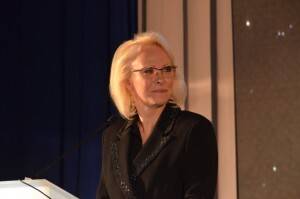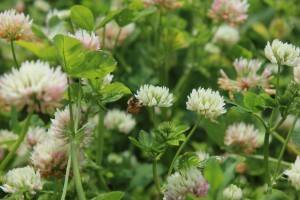Risa Demasi (pronounced Ree-sa De-macey) was the oldest of three girls raised on a second generation beef farm in Oregon, but she never dreamed about following an agricultural career path. Risa isn’t known for following herd; she’s known for her impeccable style. The seed company she helped found is known for providing novel solutions for growing concerns through plant breeding and production of turf, forages and cover crops.
“Originally, I thought I was passionate about the fashion industry,” says Risa, who studied music at Hesston Mennonite College in Kansas. “As it turned out, I’m just passionate about clothes!”
Interestingly enough, a job in fashion is what led to the seed industry. One day when she working at Nordstrom’s, a regular customer invited Risa to join a newly formed seed company as a shipping assistant. Risa’s knowledge and responsibilities grew as Olsen-Fennell Seed, Inc. grew.

Olsen-Fennell sold to ABT (AgriBioTech), a publicly traded company. The company continued growing through acquisitions and mergers but went bankrupt in April 2000. Days after the ABT bankruptcy, Jerry Hall – whom Risa describes as a brilliant plant breeder with a great mind for business – called and asked her to consider co-founding the business. She didn’t hesitate to say yes!
“I enjoy the freedom to try new ideas,” says Risa, co-founder/partner of Grassland Oregon. “Our philosophy is our tagline, ‘Novel Solutions for Growing Concerns.’ Our drive to take the lead provides value-added solutions for our customers, farmers and consumers. As a result of more than a decade of research and breeding efforts, Grassland Oregon is releasing highly effective varieties of novel cover crops including species that have never before been grown in the United States.”
Rebuilding soils and conserving natural resources are top priorities for U.S. farmers, but today’s political climate has spiked interest in soil conservation practices and cover crops. More consumers than ever are voicing their opinions about plant breeding and modern farming practices. That’s why Risa, the American Seed Trade Association’s (ASTA) first female officer and outgoing chairwoman, says it’s more important than ever for those involved with the seed business to help others understand the industry. This week, as she presided over the 133rd annual convention (#ASTAannual) in Portland, Risa issued a challenge to her seed industry colleagues.
Challenge to Seed Industry Colleagues
 The American Seed Trade Association was founded in 1883 and represents more than 700 companies in seed production and distribution, plant breeding, and related industries in North America. As directed by its members, ASTA is involved in nearly all issues relating to plant germplasm.
The American Seed Trade Association was founded in 1883 and represents more than 700 companies in seed production and distribution, plant breeding, and related industries in North America. As directed by its members, ASTA is involved in nearly all issues relating to plant germplasm.
“You get out of it what you put into it,” says Risa. “If you just pay your dues and don’t make an effort to engage or stretch yourself, you will not get much in return. However, if you participate by intentionally expecting to learn something and introducing yourself to other members, I guarantee you will feel it was a worthy investment.”
We are in one of the best industries/professions on the planet and we can make a difference, adds Risa. An ASTA membership:
- Amplifies your voice by joining with those who face the same challenges you do;
- Allows you to make an even bigger different in the world; and
- Helps you connect the dots between challenges and solutions. You never know who you might meet that will make the difference in your business or your career!
 “As our communications message aptly states – Better Seed, Better Life – we are improving the quality of life for everyone. Everything starts with a seed! I am very proud of ASTA’s communications efforts. We recognized that we needed to meet people where they are and to speak their language rather than our “industry-speak.” This moves us from being reactionary to being thought leaders. We’re establishing ourselves as the credible resource we are, providing confidence to consumers, regulators and legislators.”
“As our communications message aptly states – Better Seed, Better Life – we are improving the quality of life for everyone. Everything starts with a seed! I am very proud of ASTA’s communications efforts. We recognized that we needed to meet people where they are and to speak their language rather than our “industry-speak.” This moves us from being reactionary to being thought leaders. We’re establishing ourselves as the credible resource we are, providing confidence to consumers, regulators and legislators.”
In honor of Risa’s service to the seed industry – and in celebration of National Pollinator Week – it’s only fitting to share a recipe using honey. Grassland Oregon rents bees to pollinate its clover fields and then contracts with the beekeeper to purchase the honey produced. Its honey is then distributed to customers and growers.
Honey Cornbread
Ingredients
Ingredients:
1 cup all-purpose flour
1 cup yellow cornmeal
¼ cup white sugar
1 tablespoon baking powder
1 cup heavy cream
¼ cup vegetable oil
¼ cup honey
2 eggs, lightly beaten
Directions
Directions:
1. Preheat oven to 400 degrees F. Lightly grease a 9×9 inch baking pan.
2. In a large bowl, stir together flour, cornmeal, sugar and baking powder. Make a well in the center of the dry ingredients. Add the cream, oil, honey and eggs; stir to combine. Pour batter into the prepared baking dish.
3. Bake in preheated oven for 20 to 25 minutes, until a toothpick inserted into the center of the pan comes out clean.
Excellent served fresh out of the oven topped with more honey!
